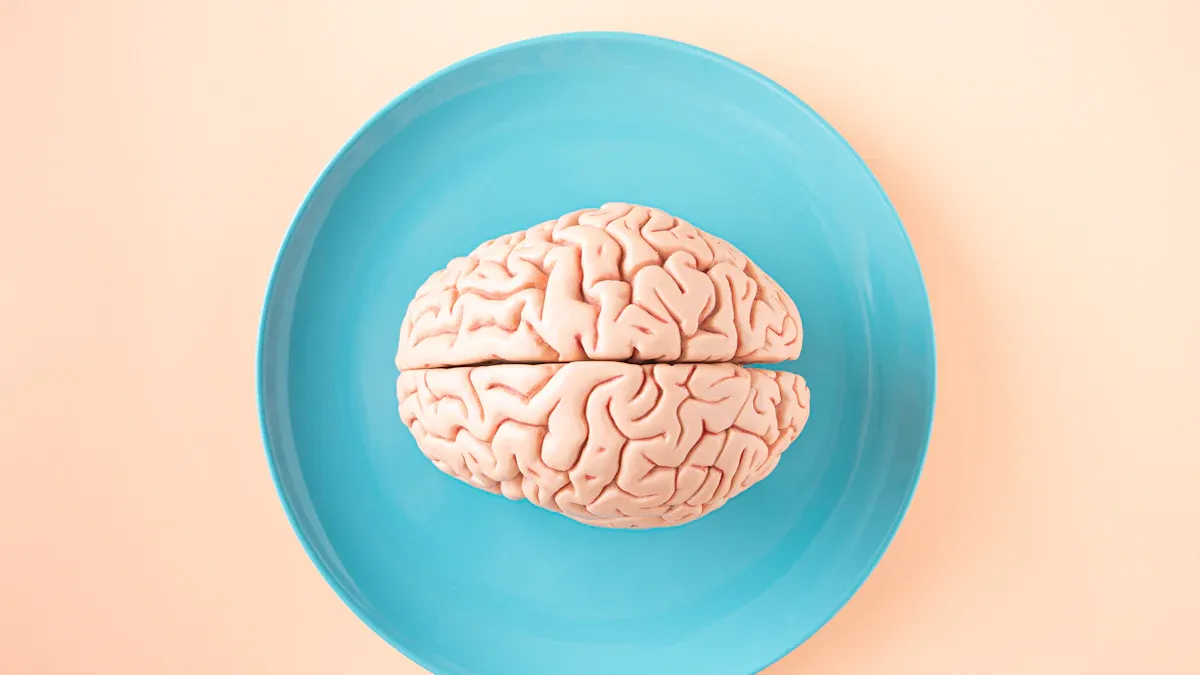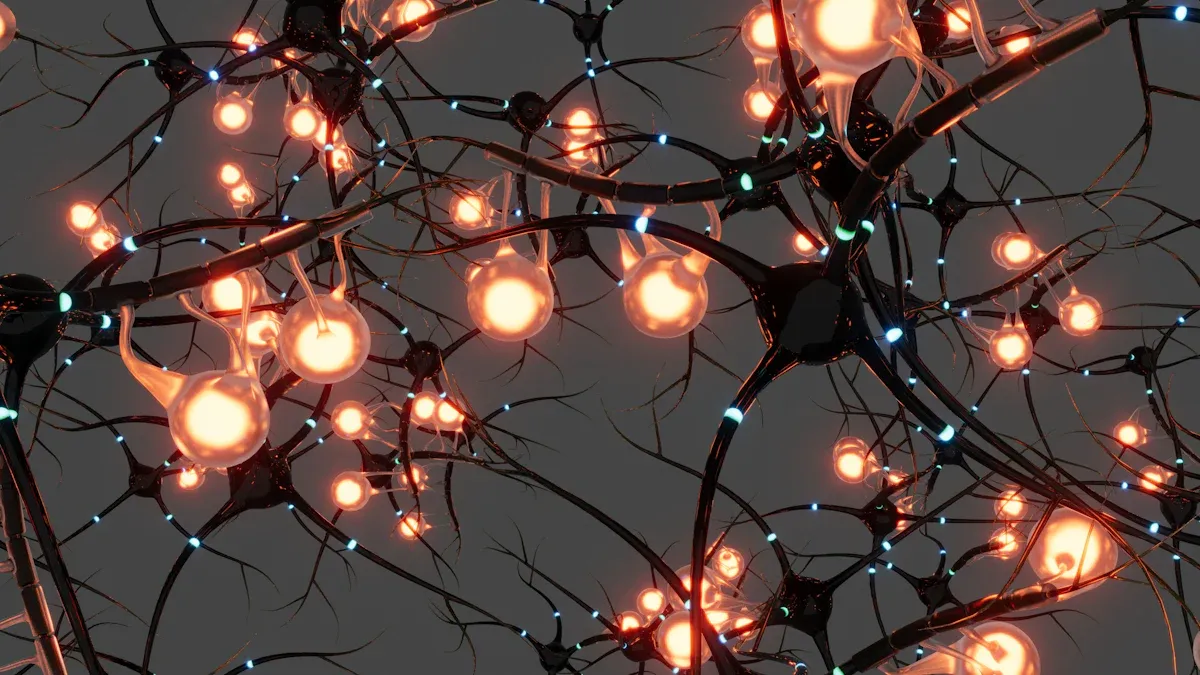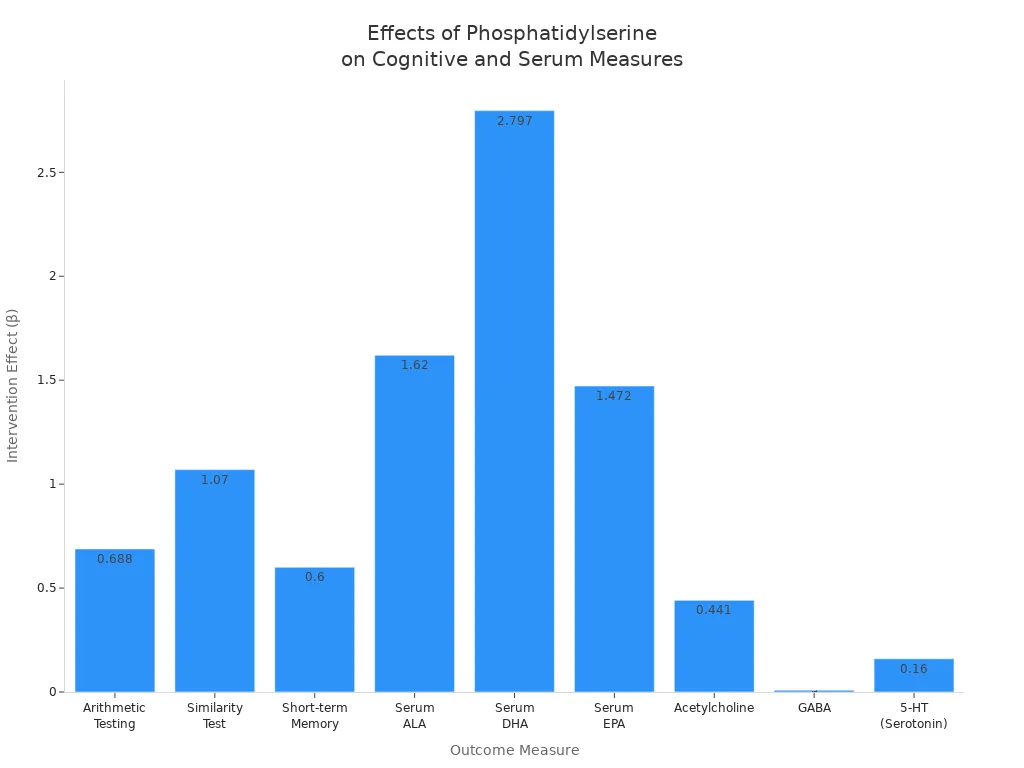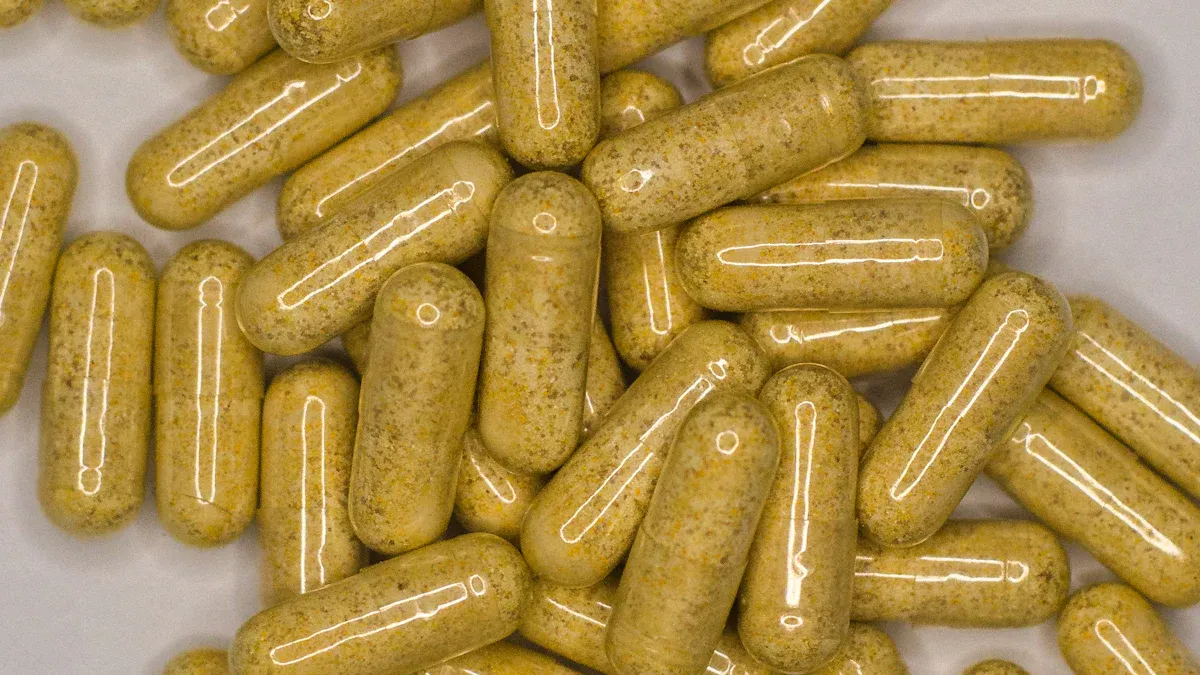
Phosphatidylserine powder may help keep the brain healthy. It is helpful for older adults with mild cognitive impairment. New studies show big improvements in memory and thinking after regular use. The results are even better when used with other nutrients. Many people notice better thinking and daily skills than those who take a placebo.
- People often ask about:
- How well it works for memory and focus
- How the supplement helps the brain
- If it is safe to use every day
- Who can get the most help from it
Phosphatidylserine powder is still very popular. Millions of people use it for better thinking.
Key Takeaways
- Phosphatidylserine powder helps the brain work better. It can make memory, focus, and mood better for kids and adults.
- Taking 100 to 300 mg each day is helpful. Soy-based phosphatidylserine is often used. It keeps brain cell membranes healthy. It also helps nerve cells talk to each other.
- This supplement can help lower stress. It may help you sleep better. It does this by lowering stress hormones like cortisol.
- Phosphatidylserine powder is usually safe. It only has a few mild side effects. Start with a small dose. Talk to a doctor if you have health problems.
- Research shows it can help, but results are different for everyone. More studies are needed. We need to know more about long-term use and the best amount to take.
What Is Phosphatidylserine?
Structure and Sources
Phosphatidylserine (PS) is a kind of fat called a phospholipid. It has a glycerol base, two fatty acid chains, a phosphate group, and a serine head group. The serine head group has both an amine and a carboxyl group. This makes PS different from other phospholipids like phosphatidylcholine or phosphatidylethanolamine. These differences give PS special jobs in the body.
| Feature | Phosphatidylserine (PS) | Other Phospholipids (e.g., Phosphatidylcholine, Phosphatidylethanolamine) |
|---|---|---|
| Chemical Structure | Glycerol base, two fatty acids, phosphate, serine head group (with amine and carboxyl) | Glycerol base, two fatty acids, phosphate, simpler head groups (choline or ethanolamine) |
| Membrane Distribution | Mostly in the inside part of plasma membranes | Spread more evenly on both sides of the membrane |
| Functional Roles | Special jobs in cell signals and brain work | Mostly give shape and softness to membranes |
| Polarity and Amphipathic Nature | Very amphipathic because of the complex head group | Not as amphipathic |
| Clinical Significance | Needed for brain health and cell messages | Mostly for structure |
PS is found most in the brain. People do not get much PS from normal foods. Long ago, supplements were made from cow brains. Now, most PS powder comes from soybeans. This plant source is safer and works just as well as animal PS.
Tip: Soy-based phosphatidylserine is best for supplements because it does not have the risks of animal sources.
Role in Nerve Cells
Phosphatidylserine is important for nerve cells. It makes up about 13–15% of the phospholipids in the brain. PS is mostly in the inside layer of nerve cell membranes. This helps nerve cells send signals and talk to each other.
| Functional Aspect | Supporting Details |
|---|---|
| Membrane Localization | PS stays mostly in the inside layer of nerve cell membranes and myelin. |
| Neurotransmitter Release | PS helps nerve cells let out chemicals like acetylcholine and dopamine. |
| Signal Transduction | PS pulls in proteins and calcium ions, which start cell signals for growth and survival. |
| Membrane Fluidity | PS keeps the cell membrane soft, which helps brain cells talk. |
| Supplementation Effects | Taking PS powder can raise its level in brain cells, which may help memory and thinking. |
PS also helps nerve cells let out neurotransmitters, which are chemicals that send messages between cells. It helps nerve fibers grow and keeps brain cells healthy. When people take PS supplements, the body uses it to help these brain jobs.
Phosphatidylserine Powder and Brain Function

Membrane Health
Phosphatidylserine powder helps brain cell membranes stay healthy. These membranes work like shields for each nerve cell. They decide what can enter or leave the cell. When membranes are healthy, nerve cells send signals fast and clear. Taking phosphatidylserine powder adds more of this fat to the brain. This keeps the membranes soft and bendy.
Scientists learned that phosphatidylserine powder can pass the blood-brain barrier. This means it moves from the stomach, through the blood, and into the brain. If people take 300 to 800 mg each day, the body takes it in well. Once in the brain, it helps nerve cells and their myelin stay strong. This can slow or even fix damage to nerve cells. So, memory, learning, and thinking may get better.
Note: Healthy cell membranes help brain cells talk fast and clear.
Neurotransmitter Support
Phosphatidylserine powder also helps the brain send messages. It helps nerve cells let out neurotransmitters, which are chemicals that carry signals. These include dopamine and serotonin. They help with mood, memory, and focus.
- Phosphatidylserine powder keeps membranes soft so nerve cells can let out neurotransmitters.
- It helps nerve cells talk at the synapse, the small gap between cells.
- It helps receptors work, so they can get signals from other cells.
- It helps keep mood steady by helping release dopamine and serotonin.
- It can lower stress by helping control cortisol, the main stress hormone.
A study in 2015 found people with depression felt better after taking phosphatidylserine powder with DHA and EPA for 12 weeks. Their mood got better, and their depression scores dropped. Another study showed kids with ADHD had better focus and less hyperactivity when they took phosphatidylserine powder with omega-3 fatty acids. These studies show this supplement can help mood and attention.
Phosphatidylserine powder helps the brain’s message system work well. It helps nerve cells send and get messages. This supports memory, learning, and mood balance.
Cognitive and Emotional Benefits
Memory and Focus
Phosphatidylserine powder helps memory and focus in kids and adults. Studies show it helps nerve cells send signals better. This makes attention and learning easier. The table below shows what happened in some studies:
| Population | Intervention | Duration | Outcomes Measured | Key Findings |
|---|---|---|---|---|
| Children with ADHD (4-14) | 200 mg/day PS | 2 months | ADHD symptoms, memory, attention | Kids had better focus, less hyperactivity, and better memory. They made fewer mistakes. No side effects. |
| Young healthy adults | PS supplementation | Not given | Mental performance, stress | Adults did better on thinking tests and handled stress better. |
| Golf players (adults) | PS supplementation | Not given | Motor skills, stress | Golfers moved better and felt less stress. |
Researchers saw that phosphatidylserine powder helps the brain send messages. This helps working memory and focus. It is helpful for kids with ADHD and adults who feel stressed.
Mood and Stress
Phosphatidylserine powder can help with mood and stress. Many studies looked at how it works:
- Taking a soy-based phosphatidylserine and phosphatidic acid complex (PAS) lowered stress hormones like ACTH and cortisol.
- PAS made people feel less anxious and helped the body handle stress.
- People with mood problems, like depression or bipolar disorder, felt better after taking PS.
- When PS was taken with PA, it lowered cortisol and helped people feel better during social stress.
- How well it worked depended on the dose and how stressed the person was.
One study in young adults showed that taking PS every day made people feel happier and less stressed, even during hard mental work.
Sleep and Well-being
Phosphatidylserine powder can help people sleep better by lowering stress hormones at night. Studies show that PS, especially with omega-3 fatty acids, helps control cortisol. Less cortisol at night means better sleep. This is important for older people with memory problems. Good sleep helps mood and thinking. PS also helps nerve cells work well. This may help people feel better and lower the bad effects of stress.
Research Evidence
Clinical Studies
Scientists wanted to see how phosphatidylserine powder helps thinking and memory. Many studies found people did better on memory and focus tests after taking it. The table below shows results from new studies. People who took phosphatidylserine powder did better than those who took a placebo.
| Outcome Measure | Intervention Effect (β, 95% CI) | Significance Compared to Placebo |
|---|---|---|
| Arithmetic Testing | 0.688 (0.103 to 1.274) | Statistically significant |
| Similarity Test | 1.070 (0.472 to 1.667) | Statistically significant |
| Short-term Memory | 0.600 (0.399 to 0.800) | Statistically significant |
| Serum α-Linolenic Acid (ALA) | 1.620 (0.967 to 2.265) | Statistically significant |
| Serum DHA | 2.797 (1.075 to 4.532) | Statistically significant |
| Serum EPA | 1.472 (0.296 to 2.643) | Statistically significant |
| Acetylcholine | 0.441 (0.415 to 0.468) | Statistically significant |
| GABA | 0.009 (0.001 to 0.016) | Statistically significant |
| 5-HT (Serotonin) | 0.160 (0.081 to 0.238) | Statistically significant |
🧠 Note: Better short-term memory was linked to more α-linolenic acid in the blood. This explained about 19.7% of the effect.

These findings show phosphatidylserine powder can help with memory, focus, and mood. It does this by raising important brain chemicals.
Effects in Children and Adults
Scientists tested phosphatidylserine powder in kids and adults. In kids with ADHD, it helped them focus and be less hyper. Kids made fewer mistakes on memory tests and paid more attention in class. Most kids did not have any side effects.
Adults got benefits too. Older adults with memory problems remembered things better after taking it. Healthy young adults did better on thinking tests and felt less stress during hard work. Some athletes, like golfers, moved better and felt calmer after using it.
Animal studies back up these results. Middle-aged rats who got soybean phosphatidylserine learned tasks faster. These rats avoided danger better than rats who did not get it. But the supplement did not help with every kind of learning or movement. Scientists saw similar results in people, but the tests were not the same.
Researchers agree phosphatidylserine powder helps memory and focus for many people, but results can be different.
Antioxidant and Neuroprotective Actions
Phosphatidylserine powder does more than help memory. It also protects brain cells from harm. This supplement acts as an antioxidant. It helps clear away bad molecules called free radicals. These can hurt brain cells and make aging faster.
Studies show phosphatidylserine powder keeps nerve cells healthy. It helps cell membranes stay strong and flexible. This makes it easier for brain cells to send signals. In people with diseases like Alzheimer’s, the supplement may slow down cell damage. It also helps the brain heal from stress and injury.
🛡️ Tip: Protecting brain cells from harm may help keep the mind sharp as people get older.
Limitations and Gaps in Current Research
Even though many studies show good results, there are still some gaps. Most studies use small groups of people. Scientists need bigger studies to be sure. Some studies only last a few weeks or months. We do not know all the long-term effects yet. Results may also depend on age, health, and the type of phosphatidylserine used. More research will help answer these questions.
Safety and Dosage

Recommended Use
Most studies say people can take between 100 mg and 300 mg of phosphatidylserine powder each day. Some research lets people use up to 400 mg for a short time. People often split the total amount into two or three smaller doses. Taking it with food can help your body use it better. Kids and adults may need different amounts, so always check the label or ask a doctor.
🕒 Tip: Begin with a small dose and see how you feel.
Side Effects
Phosphatidylserine powder is safe for most people if they use it the right way. Some people might get mild side effects. These can be an upset stomach, trouble sleeping, or feeling jumpy. These problems usually stop if you lower the dose or stop taking it. Allergic reactions do not happen often. If you are allergic to soy, check where the supplement comes from.
| Possible Side Effect | How Common? | What To Do |
|---|---|---|
| Stomach upset | Uncommon | Take with food |
| Trouble sleeping | Rare | Lower the dose |
| Restlessness | Rare | Stop use if it continues |
| Allergic reaction | Very rare | Seek medical help |
There are no known problems between phosphatidylserine powder and most prescription drugs. But people who are pregnant, nursing, or taking medicine should talk to a doctor before using any new supplement. Using a drug-nutrient checker can help find any problems.
Who Should Use
Phosphatidylserine powder may help people who want better memory, focus, or mood. Older adults with mild memory trouble may get the most help. Some kids with attention or learning problems also do better. Healthy adults who feel stressed or want to keep their minds sharp sometimes use it. People with soy allergies, pregnant women, and those on medicine should ask a doctor first.
⚠️ Note: Always talk to a doctor before starting any new supplement, especially for kids or people with health problems.
Phosphatidylserine powder might help with memory, focus, and mood for some people. Some studies show it can help, but the results are not always the same. People should remember these key things:
- Research is still new and not always sure.
- There is no one dose that works for everyone.
- The quality of supplements can be different for each brand.
- Side effects can happen, mostly if you take a lot.
- Some medicines might not work well with this supplement.
A doctor or nurse can help you know if this supplement is right for you.
FAQ
What is the best time to take phosphatidylserine powder?
Most people take phosphatidylserine powder with food. It works best if you take it in the morning or early afternoon. This helps your body use it well and helps your brain work during the day.
Can children use phosphatidylserine powder safely?
Studies say kids can use phosphatidylserine powder safely if they use the right amount. Parents should always ask a doctor before giving any supplement to their child.
Does phosphatidylserine powder interact with medications?
Phosphatidylserine powder almost never causes problems with most medicines. People who take prescription drugs should still talk to a doctor before starting any new supplement.
How long does it take to notice benefits?
Some people feel their memory or mood get better in a few weeks. Others might need up to three months. How fast it works depends on age, health, and why you use it.
Is soy-based phosphatidylserine better than animal-based?
Soy-based phosphatidylserine is safer and used more often. It does not have the risks that come with animal sources. Most experts say to use soy-based products every day.








